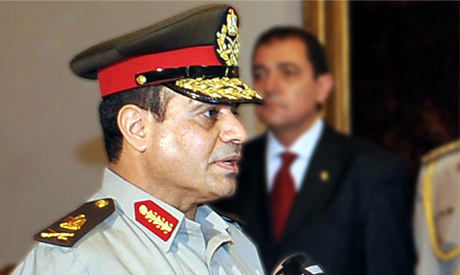CAIRO: Egypt’s government will back down in a stand-off with Washington over US funding for civil society groups because allowing the dispute to drag on could jeopardize aid worth billions of dollars, two Egyptian officials said.
Nineteen Americans are among 44 foreign and local activists banned from leaving Egypt and referred to a criminal court, accused of managing unlicensed non-governmental organizations and receiving foreign funds without official approval.
Some of the US citizens, belonging to the US-funded National Democratic Institute (NDI) and International Republican Institute (IRI), sought refuge in the American Embassy.
Washington has asked Egypt to drop the travel bans and allow the groups targeted in the investigation to resume their work. Both Congress and the White House have warned that the crackdown could threaten its yearly $1.3 billion US military support.
Egypt’s government has thrown up its hands, saying it cannot interfere in judicial business, and reacted with indignation to US criticism of the crackdown. One minister said Egypt does "not accept threats from the United States".
Washington is unlikely to accept the government’s claim of impartiality in the case, which underscores tensions between the two long-standing allies since the overthrow of Egyptian President Hosni Mubarak last February.
But two officials involved in Egypt’s diplomatic strategy said the army rulers want to ease the tension to ensure the aid keeps flowing and get American help to ensure favorable terms for an International Monetary Fund support package for Egypt.
"The travel ban will be lifted and the escalation will cease," one of the officials told Reuters on condition of anonymity. "Egypt needs the loans and the IMF funds to come through, but better terms are needed."
He said army leaders believed the US government can help Egypt secure the IMF money on favorable terms.
The second official said: "A more manageable IMF deal and maintaining the military aid are high priorities for the generals".
An Egyptian military delegation to Washington abruptly cancelled meetings with civilian US lawmakers to return to Cairo on Monday.
It had met military counterparts at the Defense Department, President Barack Obama’s security team and top diplomats covering the Middle East and military affairs.
On Tuesday a leading member of Egypt’s ruling Supreme Council of the Armed Forces told Reuters he would travel to Washington within the next two days for a follow-up visit.
Suspicion
The row has also exposed tension between the US Congress and defense officials, who want the dispute over the NGOs to be resolved without threatening the strong military relationship with Egypt.
"It’s our sense that much of the NGO issue in Egypt has a lot to do with internal politics. The Egyptian military leadership is watching that trend very closely, and thus may not want to act too hastily to intervene," a US official told Reuters.
"The linkage to continued US financial assistance is a possibility, too. But American aid wasn’t really in major jeopardy to begin with, and the Egyptians have to know that the NGO issue is only making it easier for critics of the Egyptian government to call for halting aid — especially on Capitol Hill," the US official said.
Egypt’s government believes its US ties can return quickly to normal given its status as guarantor of a peace treaty with Egypt’s neighbor Israel, Washington’s closest ally in the Middle East, the officials said.
But Washington, which supported Mubarak until the uprising against his three-decade rule became an unstoppable force, is struggling to find a comfortable relationship with the men who replaced him in power.
The military has overseen Egypt’s fairest election in six decades, has urged a swift move to a presidential election — a final step before they step aside as promised by mid-2012. Critics say the army leadership will resist civilian control of the defense budget and their business interests.
Crackdowns on protests against military rule have left dozens dead since November and a pledge to lift an emergency law has only been partially met.
The investigation of foreign-funded NGOs has fuelled accusations from rights groups that the army is obstructing Egypt’s democratic transition.
The US Congress now wants to make US aid to Egypt’s military conditional on its steps towards democratization.
Yet a Pentagon official said ties with Egypt were "too strategically important to be broken" and the Pentagon backed "a controlled handover to civilian rule".
The head of Egypt’s military council, Field Marshal Mohamed Hussein Tantawi, spoke on the phone to US President Barack Obama on Jan. 20 and discussed Egypt’s foreign funding needs and the NGO crackdown, said two people with knowledge of the call.
Obama told Tantawi the US had no control over the IMF deal or other loans. Tantawi responded that his military council had no control over the Egyptian investigation on NGOs, they said.
The call ended with a mutual promise to find areas of agreement.
Military aid to Egypt began flowing after it became the first Arab nation to sign the peace deal with Israel in 1979.
The army receives $1.3 billion annually, about 25 percent of Egypt’s defense spending per year. The defense budget was $4.56 billion in 2010 — the third-largest in the Middle East after Israel and Saudi Arabia — according to the Center for Strategic and International Studies, an Egyptian think tank. –Additional reporting by David Alexander and Andrew Quinn in Washington.
